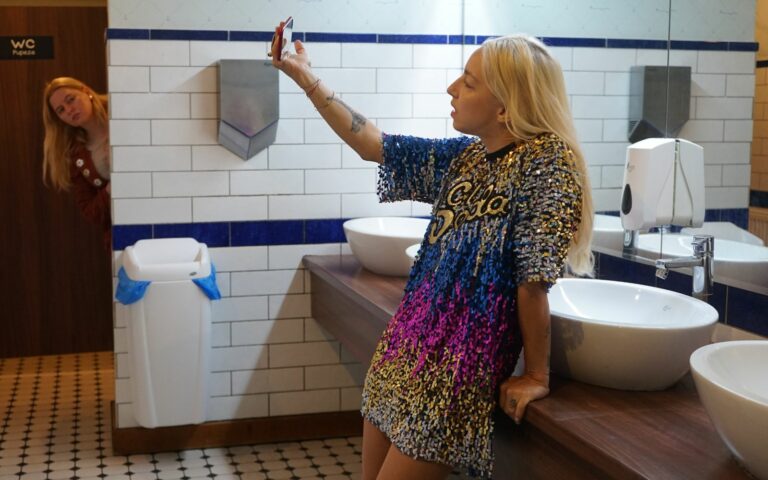By Alexia Bréard-Anderson
Montréal’s premier gathering for electronic music and digital creativity returns with an immersive three-act program bridging AI, XR, Indigenous tech, and ecological imagination.

Radu Jude’s latest genre-blurring dark comedy careens far beyond its exhaustive 164-minute run-time. Packing every frame to the brim with significance and signifiers, the Romanian cult auteur tackles a rolodex of societal ills and the history of cinema all with one punch. As radical in form as it is in content, Do Not Expect Too Much from the End of the World (DNETMFTEOTW) folds the web that connects capitalism with globalisation with patriarchy with xenophobia with death into something as dense as a moment can allow. And by containing this treatise in a movie that calls attention to its own construction, Jude tethers another integral thread to that web: media, the use of images and narrative to create the social consent for corporations to turn human beings into fodder for profit.
It’s a degree of genius that understands filmmaking as more than a vehicle for a story, but as an artform unique in its ability to combine mediums, sculpting rich worlds of sound, visuals, movement, music, colour, composition, character and plot. It’s what attracted actress Ilinca Manolache to work with Jude on his 2016 film I Do Not Care If We Go Down in History as Barbarians, and motivated her to keep on as a creative collaborator for every film to follow.
“It’s so inspiring to be around him. He’s so restless. He never unplugs himself because he’s so curious and so eager to do cinema,” Manolache tells RANGE. “He’s like an encyclopaedia of things and not in a boring way. He’s so generous and shares a lot.”
To prepare for her role as Angela, a spunky production assistant who works 20-hour days while driving through Bucharest’s traffic, Manolache watched Andy Warhol films and Nico performances to hone a sense of dull mania. The scorching, overexposed black and white film is as challenging as sitting alongside Angela as she lurches across Bucharest’s clogged highways, pleading for a break from work to no avail while shouldering harassment from male drivers.

An international furniture conglomerate with outposts in Romania has hired her team to film a safety PSA. Angela spends the bulk of the film crisscrossing the city, meeting with company workers who have been disabled by workplace injuries. They can’t afford to pay utilities, yet the company has recorded record profits. They’re all vying for a $1000 cheque, to be earned by going on camera and testifying that the accidents were their fault, when the blame actually falls on corporate and civic negligence.
DNETMFTEOTW closes with a 30-minute still take of the PSA film set, as the director leaves the camera running. An employee and his family stand in the alley where his accident took place as he recounts the details of the incident that left him paralysed. The scene devolves into hair-pulling farce as the video turns increasingly propagandistic. By the end of the overstimulating, whipsmart saga, the viewer feels the lead-bodied fatigue of exploitation.
Jude, who started his filmmaking career on the bottom rung, says this story was prompted by real life events, in which a colleague of his, after being overworked and exhausted, fell asleep at the wheel and died. Manolache calls the film industry in Romania a “very rotten system” in which foreign companies take advantage of the country’s lower wages and underpay crew. “You work, I don’t know, 18, 20 hours non-stop,” she says.
Even though DNETMFTEOTW pulses with the dynamic realism of life itself, Manolache explains that every detail was planned. “While I was reading the script, I felt so empowered and I felt the energy in the writing, the energy that afterwards you see in the movie, it was there in the script and it’s Radu’s magic,” she says.

“But on the other hand,” she continues, “Radu says that every fictional movie has a documentary part because the actors give the movie their voice, their appearance, their way of speaking, their energy.”
Jude hired non-professionals with disabilities and shot on real locations to assemble his story with the raw matter of reality. He also incorporated Bobita, a character Manolache had created using a bearded filter, an alt-right chauvinist who spews vitriol on TikTok. Working in Romania’s conservative theatre scene, it was a way for her to express herself without constraint and cope with sexism on social media. In DNETMFTEOTW, when the people around Angela complain about Bobita’s vulgarity, she explains: “I’m critical by way of extreme caricature, like Charlie Hebdo.”
Radu captures life and expands it. He took Bobita and broadened his horizons beyond sexism, connecting his despicable ideology to the British monarchy, consumerism, homophobia, and the manosphere. He understands the interconnections that define contemporary life, and he has the filmmaking chops to carry big ideas to their most visceral conclusions.
Do Not Expect Too Much From the End of the World hits is now screening in select Canadian theatres and hits MUBI from May 3.
By Alexia Bréard-Anderson
Montréal’s premier gathering for electronic music and digital creativity returns with an immersive three-act program bridging AI, XR, Indigenous tech, and ecological imagination.
By Adriel Smiley
Ian Mark Kimanje’s powerful documentary traces Carnival’s roots from slavery and survival to global celebration.
By Liam Dawe
With genre-defying bookings and once-in-a-lifetime artist pairings, the 46th edition keeps rewriting the folk playbook.